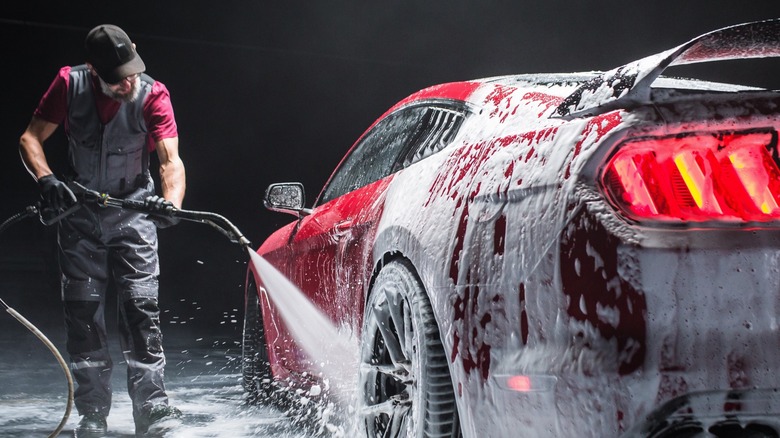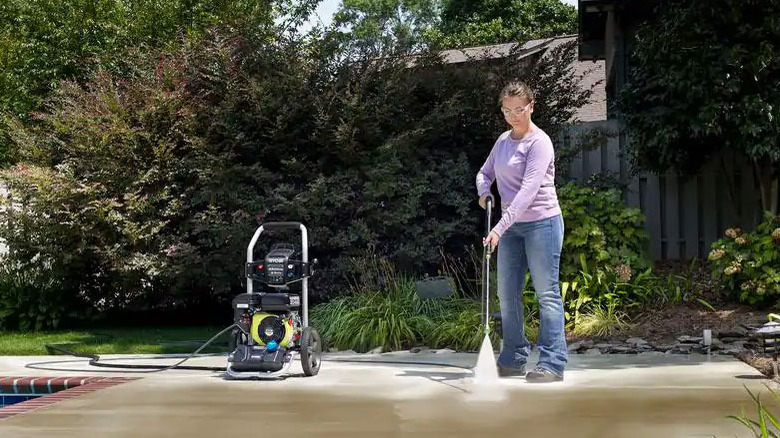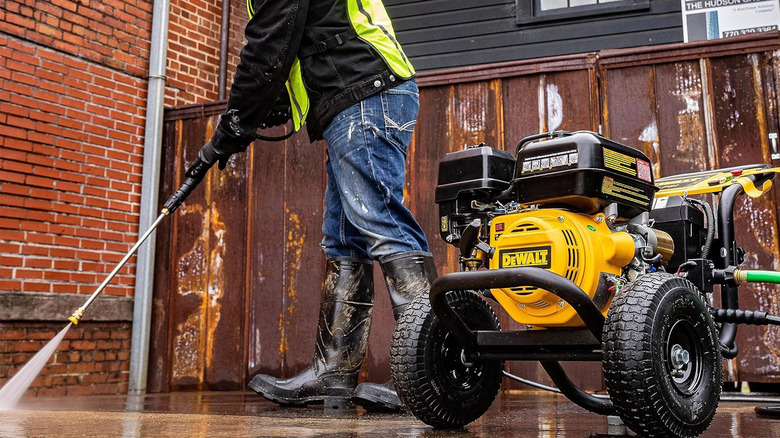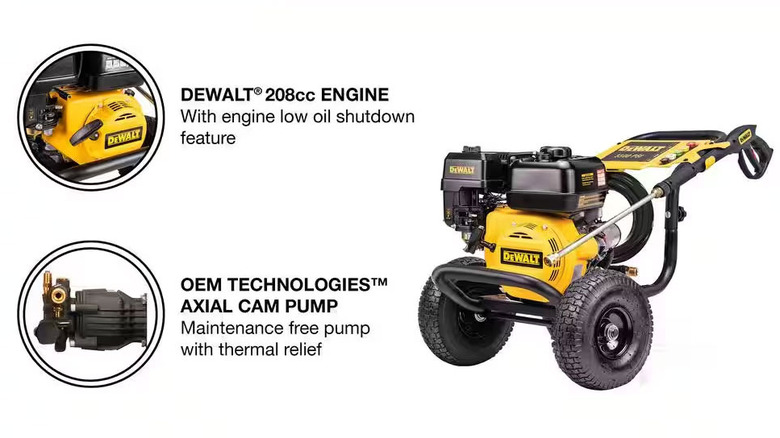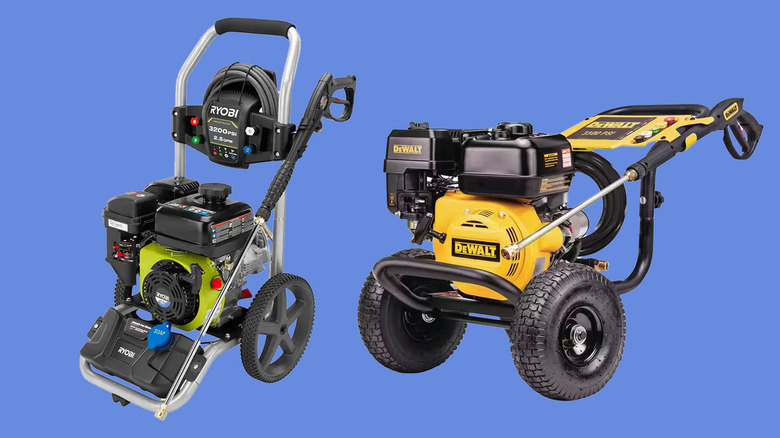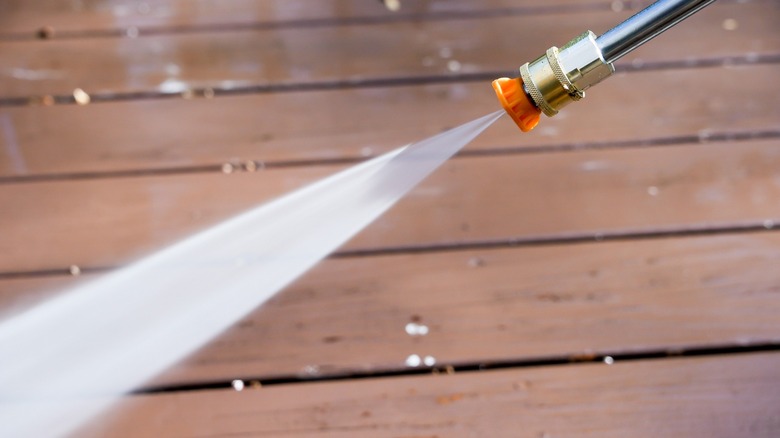Ryobi Vs DeWalt: Who Makes The Better Pressure Washer?
We may receive a commission on purchases made from links.
Pressure washers are a key piece of equipment if you find yourself having to clean outdoor surfaces regularly. Useful for a variety of home chores, like cleaning driveways, decks, and garages, the machine can become an indispensable tool for any homeowner. While many opt to rent pressure washers, buying one becomes a much more viable option when one considers that they typically aren't all that expensive and can save money for those who rent the machine often. However, narrowing down the choice in a sea of brands can be a much harder endeavor.
DeWalt and Ryobi are two tool brands well-known for their power drills and saws, but both companies also have a large inventory of pressure washers in electric and gas varieties. The two key metrics in comparing any pressure washer are the pounds per square inch (PSI) and gallons per minute (GPM). PSI dictates the water pressure or power from the pressure washer. GPM determines the equipment's flow rate or the amount of water passing through the machine's hoses.
Because there are so many variations of washers for both DeWalt and Ryobi, it's important to draw comparisons between similar pressure washers. For the purposes of this comparison, we'll be comparing a Ryobi 3200 PSI 2.5 GPM Cold Water Pressure Washer sold at The Home Depot with the DeWalt 3300 PSI 2.4 GPM Gas Cold Water Pressure Washer also sold at The Home Depot.
What are Ryobi pressure washers?
Ryobi is a power tool brand that is best known for its line of cordless handheld power tools, like its drivers and handsaws. Available online and at The Home Depot, the brand is recognizable by its tools' lime green and black color scheme. Ryobi is owned by Techtronic Industries Co Ltd or TTI, a company based out of Hong Kong. Interestingly, TTI also owns other recognizable brands, including Milwaukee and Hoover.
Ryobi has a wide variety of pressure washers that are suitable depending on the project size. Prices for their machines can range anywhere from $139 to well over $500, depending on the model. As they are known for their cordless electric power tools, Ryobi has a wider selection of electric-powered pressure washers with handheld and on-wheel variations. PSI for their variety of pressure washers ranges anywhere from 1500 to 3600 PSI on their most powerful Honda-engine-powered gas models.
What are DeWalt pressure washers?
DeWalt is a popular tool brand company owned by Stanley Black & Decker, which also owns Craftsman, Irwin Tools, and Lenox tool brands. Based in the United States, DeWalt tools are sold in a variety of retail and home improvement stores, including Lowe's, Acme, and Ace. While the brands under Stanley Black & Decker put an emphasis on assembling products in the United States, power and pressure washers are not listed on DeWalt's website as being produced domestically.
DeWalt pressure washers have a variety of different pressure washer options available. Many of the pressure washers from DeWalt are on wheels and utilize Honda or DeWalt's own engines. DeWalt makes gas and electric pressure washer models priced anywhere from $350 to well over $800. PSI on the machines ranges from 1200 PSI on their weakest electric model to 4400 PSI on their most powerful machine. However, the bulk of DeWalt pressure washers have around 3000 PSI.
Parts and ease of use comparison
The Ryobi Pressure washer has a Ryobi 212 cc engine, boasting 3200 PSI, and weighs 74 pounds. The machine comes with wheels for safe and easy transport. The end of the wand for the device boasts a rotary nozzle with 5 different settings, and the machine has an onboard .95-gallon detergent tank. The Ryobi pressure washer just slightly beats out the DeWalt by .1 GPM.
The DeWalt pressure washer is lighter than its Ryobi counterpart, weighing in at 64 pounds, and has slightly more powerful 3300 PSI using a DeWalt 208 cc engine. This model of pressure washer, however, has a much more compact form factor, at just 21.5 inches high, compared to Ryobi's, which stands at 35 inches high, making transport more of a hassle for the Ryobi model. In addition, the DeWalt OEM pump features a maintenance-free crankcase, removing the need for oil changes.
Unlike the Ryobi pressure washer, DeWalt boasts 5 quick-connect nozzles, meaning there are four components not attached to the machine that could get lost. In addition, the DeWalt pressure washer lacks an onboard soap tank, something that's included in the Ryobi model. Both pressure washers come with 25-foot hoses and a wand included.
Affordability and price
DeWalt pressure washers are priced, on average, higher than Ryobi but also have higher PSI and GPM. In this comparison, however, both models are neck-and-neck. Both the DeWalt 3300 PSI 2.4 GPM gas-powered model and Ryobi 3200 PSI 2.5 GPM gas-powered model cost $399 at The Home Depot. However, just because these models are the same price doesn't mean that the fleet of washers for both brands are priced similarly.
Ryobi has a variety of different lower-PSI options on their storefront, with many pressure washers, especially handheld washers, running less than $200. However, these washers come at the sacrifice of power, as many of these lower-cost models are under 2000 PSI.
On the other hand, DeWalt's fleet is, on average, much more powerful but also more expensive. Their cheapest pressure washer option costs $349 and boasts 2100 PSI with 2.1 GPM. Their most expensive options can run over $800 but also come with over 4000 PSI and can handle 4 GPM.
Consumer review comparisons and verdict
Both the Ryobi and DeWalt pressure washers are generally rated well online, with both maintaining a 4/5 rating on The Home Depot. While the Ryobi 3300 PSI 2.5 GPM Cold Water Pressure Washer has mostly good ratings, the main complaint was that the device leaked oil, and owners of similar models on sites like Amazon have also reported similar findings. It's important to note that these negative reviews are in the minority. Positive reviews remarked on how easy it was to set the machine up and reflected positively on its power.
DeWalt, while generally rated positively for its ease of use and power, also has negative reviews. Mainly, these complaints revolve around a lack of long-term durability with the device, with others claiming that the device lacked power. Interestingly, none of the negative feedback included issues with oil leakage.
Ultimately, both DeWalt and Ryobi make solid pressure washers. While DeWalt has more powerful options for bigger cleanups, Ryobi offers more affordable options and might be the better choice if you don't plan on using the machine as often. There is also a variety and range of different pressure washers that both brands manufacture, so make sure to read individual reviews for the model you are considering purchasing. Ultimately, the best choice will come down to the size of your cleanups and how often you need to use it.
